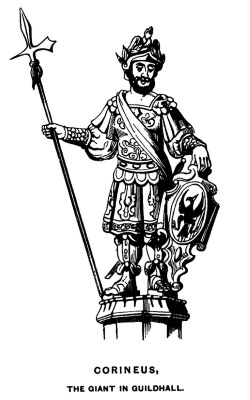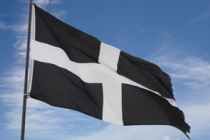Corineus - mythological descendent of Troy, great warrior and founder of Cornwall.

Corineus, in medieval British legend, was a prodigious warrior, a fighter of giants, and the eponymous founder of Cornwall.
According to Geoffrey of Monmouth's History of the Kings of Britain (1136), he led the descendants of the Trojans who fled with Antenor after the Trojan War and settled on the coasts of the Tyrrhenian Sea. After Brutus, a descendant of the Trojan prince Aeneas, had been exiled from Italy and liberated the enslaved Trojans in Greece, he encountered Corineus and his people, who joined him in his travels. In Gaul, Corineus provoked a war with Goffarius Pictus, king of Aquitania, by hunting in his forests without permission, and killed thousands single-handedly with his battle-axe. After defeating Goffarius, the Trojans crossed to the island of Albion, which Brutus renamed Britain after himself. Corineus settled in Cornwall, which was then inhabited by giants. Brutus and his army killed most of them, but their leader, Gogmagog, was kept alive for a wrestling match with Corineus. The fight took place near Plymouth, and Corineus killed him by throwing him over a cliff.
Corineus was the first of the legendary rulers of Cornwall. After Brutus died the rest of Britain was divided between his three sons, Locrinus (England), Kamber (Wales) and Albanactus (Scotland). Locrinus agreed to marry Corineus's daughter Gwendolen, but fell in love instead with Estrildis, a captured German princess. Corineus threatened war in response to this affront, and to pacify him Locrinus married Gwendolen, but kept Estrildis as his secret mistress. After Corineus died Locrinus divorced Gwendolen and married Estrildis, and Gwendolen responded by raising an army in Cornwall and making war against her ex-husband.
Locrinus was killed in battle, and Gwendolen threw Estrildis and her daughter, Habren, into the River Severn.
The tale is preserved in the works of later writers, including Michael Drayton and John Milton.
This article has been kindly provided by Kernow Matters to Us and is the first in a series on Famous Folk of Kernow (Cornwall).
Content type:
- Cornish
Language:
- English
- Log in to post comments





